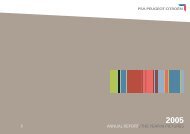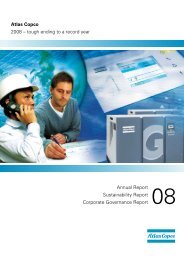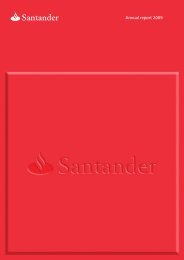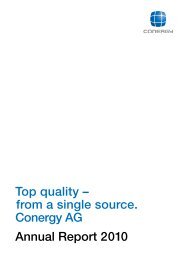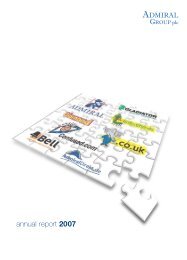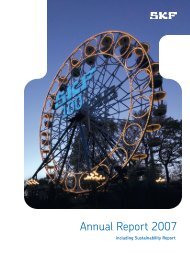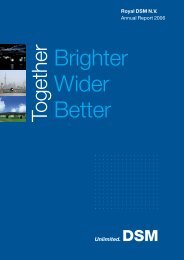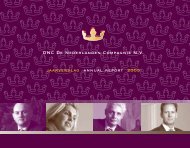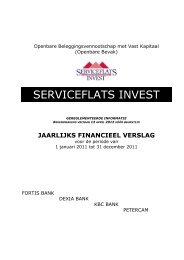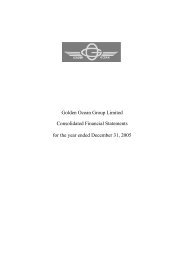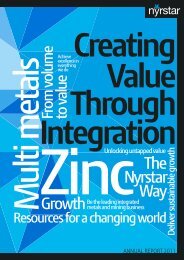ANNUAL REPORT
ANNUAL REPORT
ANNUAL REPORT
You also want an ePaper? Increase the reach of your titles
YUMPU automatically turns print PDFs into web optimized ePapers that Google loves.
FINANCIAL STATEMENTS FOR THE FISCAL YEAR ENDED MARCH 31, 2009<br />
• Transaction costs, other than share and debt issue costs,<br />
will be expensed as incurred.<br />
• Any pre-existing interest in the acquiree will be measured at<br />
fair value with the gain or loss recognized in profit or loss.<br />
• Any non-controlling (minority) interest will be measured at<br />
either fair value, or at its proportionate interest in the<br />
identifiable assets and liabilities of the acquiree, on a<br />
transaction-by-transaction basis.<br />
Revised IFRS 3, which becomes mandatory for RHJI’s March 31,<br />
2011 consolidated financial statements, will be applied<br />
prospectively and, will therefore have no impact on prior<br />
periods.<br />
Amended IAS 27 Consolidated and Separate Financial<br />
Statements (2008) requires accounting for changes in ownership<br />
interests by RHJI in a subsidiary, while maintaining control, to<br />
be recognized as an equity transaction. When RHJI loses control<br />
of a subsidiary, any interest retained in the former subsidiary<br />
will be measured at fair value with the gain or loss recognized in<br />
profit or loss. The amendments to IAS 27, which become<br />
mandatory for RHJI’s March 31, 2011 consolidated financial<br />
statements will be applied prospectively and will therefore have<br />
no impact on prior periods.<br />
Amendment to IFRS 2 Share-based Payment – Vesting<br />
Conditions and Cancellations clarifies the definition of vesting<br />
conditions, introduces the concept of non-vesting conditions,<br />
requires non-vesting conditions to be reflected in grant-date fair<br />
value and provides the accounting treatment for non-vesting<br />
conditions and cancellations. The amendments to IFRS 2, that<br />
will become mandatory for RHJI’s 2010 consolidated financial<br />
statements, with retrospective application, are not expected to<br />
have any material impact.<br />
IFRIC 15 Agreements for the Construction of Real Estate<br />
concludes that revenues for real estate construction projects<br />
will have to be recognized using the completed contract method<br />
in many cases, except for specific situations where the<br />
percentage of completion method of revenue recognition can be<br />
applied. This is the case when a contract relates to the sale of<br />
assets, but during the construction of these assets revenue<br />
recognition criteria are met on a continuous basis (in relation to<br />
the completed part of the project). IFRIC 15, which becomes<br />
mandatory for RHJI’s 2010 consolidated financial statements,<br />
with retrospective application, is not expected to have any<br />
material impact.<br />
IFRIC 16 Hedges of a Net Investment in a Foreign Operation<br />
discusses a number of issues in relation to hedging currency<br />
risks on foreign operations (net investment hedges). IFRIC 16<br />
specifically confirms only that the risk from differences between<br />
the functional currencies of the Company and the subsidiary can<br />
be hedged. Additionally, currency risks can only be hedged by<br />
every (direct or indirect) parent company, as long as the risk is<br />
only hedged once in the consolidated financial statements. IFRIC<br />
16 also determines that the hedge instrument of a net<br />
investment hedge can be held by every group company, except<br />
for foreign operation itself. IFRIC 16, which becomes mandatory<br />
for RHJI’s March 31, 2011 consolidated financial statements,<br />
with prospective application, is not expected to have any<br />
material impact.<br />
IFRIC 17 Distributions of Non-cash Assets to Owners addresses<br />
the treatment of distributions in kind to shareholders. Outside<br />
the scope of IFRIC 17 are distributions in which the assets being<br />
distributed are ultimately controlled by the same party or parties<br />
before and after the distribution (common control transactions).<br />
A liability has to be recognized when the dividend has been<br />
appropriately authorized and is no longer at the discretion of the<br />
entity, to be measured at the fair value of the non-cash assets to<br />
be distributed. IFRIC 17, which becomes mandatory for RHJI’s<br />
March 31, 2011 consolidated financial statements, with<br />
prospective application, is not expected to have any material<br />
impact.<br />
IFRIC 18 Transfers of Assets from Customers addresses the<br />
accounting by access providers for property, plant and<br />
equipment contributed to them by customers. Recognition of the<br />
assets depends on who controls it. When the asset is recognized<br />
by the access provider, it is measured at fair value upon initial<br />
recognition. The timing of the recognition of the corresponding<br />
revenue depends on the facts and circumstances. IFRIC 18,<br />
which becomes mandatory for RHJI’s March 31, 2011<br />
consolidated financial statements, with prospective application,<br />
is not expected to have any material impact .<br />
Amendments to IFRS 1 First-time Adoption of IFRSs and IAS 27<br />
Consolidated and Separate Financial Statements – Cost of an<br />
Investment in a Subsidiary, Jointly-controlled Entity or Associate<br />
(endorsed by the European Union) revises, amongst others, the<br />
accounting for ‘pre-acquisition dividends’ received from<br />
participating interests. Those dividends should be recognized as<br />
revenue, but such dividends may imply an indicator for the<br />
impairment of the participating interest. The amendment, which<br />
becomes mandatory for RHJI’s March 31, 2011 consolidated<br />
financial statements, with prospective application, is not<br />
applicable for the Company.<br />
Amendment to IAS 39 Financial Instruments : Recognition and<br />
Measurement – Eligible Hedged Items provides additional<br />
guidance concerning specific positions that qualify for hedging<br />
(‘eligible hedged items’). The amendment to IAS 39, which<br />
becomes mandatory for RHJI’s March 31, 2011 consolidated<br />
financial statements, with retrospective application, is not<br />
expected to have any material impact .<br />
Improvements to IFRSs (2008) is a collection of minor<br />
improvements to existing standards. This collection, which<br />
becomes mandatory for RHJI’s March 31, 2011 consolidated<br />
financial statements, is not expected to have any material<br />
impact.<br />
51



